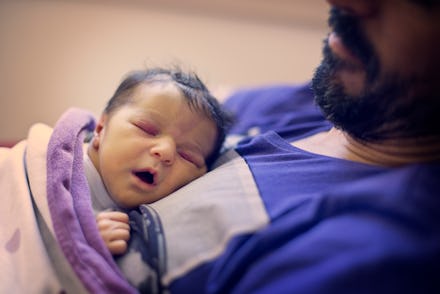There's a Problem With C-Section Births — But Science Has an Unconventional New Solution

Mere minutes after their births via cesarean section, four babies at a Puerto Rican hospital were basted in their mothers' vaginal fluids.
The process may sound peculiar, but it could be a critical step in eliminating the health risks associated with C-section births, according to new research published in the journal Nature Medicine.
Around a third of all U.S. babies are born via C-section, according to the Centers for Disease Control and Prevention. Though C-sections are deemed necessary in certain situations — such as when babies are breeched or when they're having trouble getting oxygen — the procedure also comes with proven health risks. Babies born via C-section are more likely to develop asthma, obesity and type 1 diabetes later in life, research has shown.
Scientists still haven't pinpointed an explanation for the apparent health risks.
"We don't understand why, but we think microbes may be playing a role," Maria Gloria Dominguez-Bello, an associate professor at NYU Langone Medical Center and lead author of the study, told Mic.
Babies born via C-section don't pass through their mothers' birth canals, and therefore don't pick up their mothers' vaginal bacteria — bacteria that's believed to educate babies' immune systems. So Dominguez-Bello and her team came up with an idea: An hour before four mothers underwent C-sections, sterile gauze was inserted into their vaginas. Immediately after their babies were born, the newborns were swabbed in the bacteria-laden gauze.
For a month after each baby was born, the researchers took skin, oral and anal samples and compared their microbiomes to a set of babies born vaginally, as well as to a set of babies who were born via C-section but didn't get a vaginal-bacteria bath. The results? The microbiomes of the swabbed C-section babies "resembled those of vaginally delivered infants, particularly so during the first week of life," according to the study.
"The results are compelling," Dominguez-Bello said.
It's still too early to say whether basting C-section babies in vaginal bacteria will prevent those babies from contracting certain diseases later in life. The study showed that swabbing can be a viable means of restoring vaginal bacteria to babies born via C-section — not that those bacteria are linked to disease prevention. Additionally, it only tracked the microbiomes of 18 babies — a fairly small sample size.
"The value of this small study," Dominguez-Bello said, "is more that it's a proof of principal."
If she and her team can acquire funding, Dominguez-Bello hopes to conduct a more widespread study and track babies' microbiomes throughout a longer stretch of their lives.
Where does Dominguez-Bello see C-sections 10 years down the road? First, she hopes there will be fewer of them. "We know there will have to be C-sections — C-sections save lives — but they don't have to be 30% of mothers," Dominguez-Bello told Mic. She believes the birthing process has become overly "medicalized," and that only recently, with the renewed popularity of doulas and home births, are women "learning how to give birth again."
But in the case of women who still need to deliver via C-section, Dominguez-Bello hopes to have developed a mixture of bacteria that doctors can instantly apply to their babies' bodies.
"When a C-section is necessary, we will provide the microbes that the babies are missing for not crossing the birth canal — the key ones — because we will have a lot of knowledge by then," she said. "That's my dream for the future."